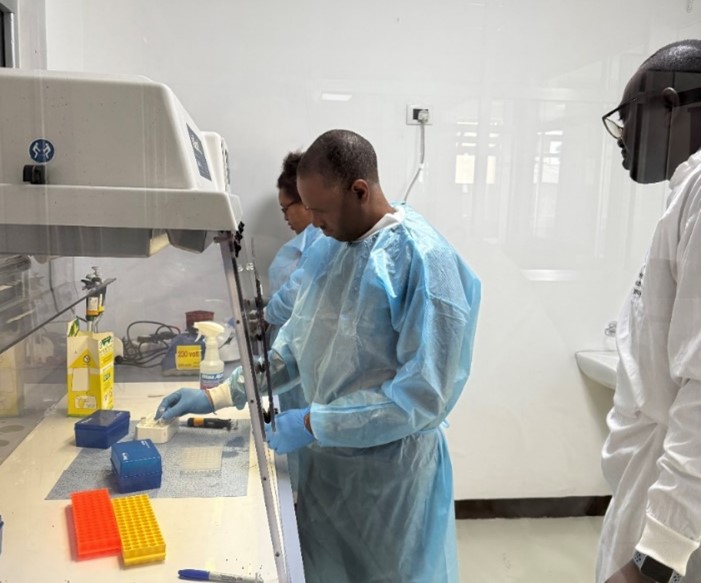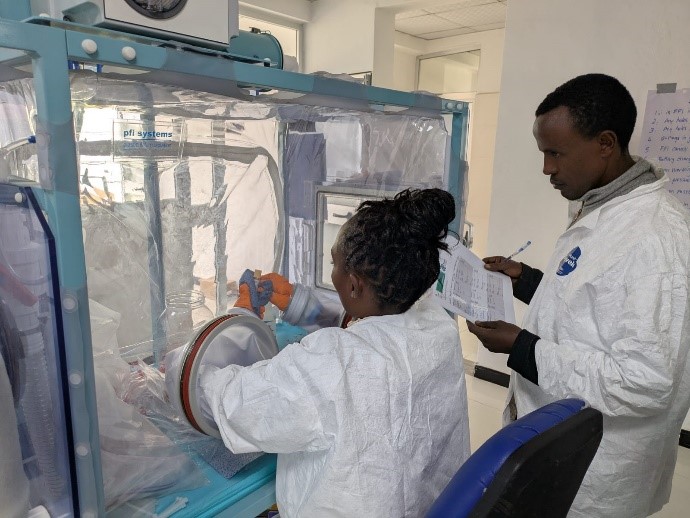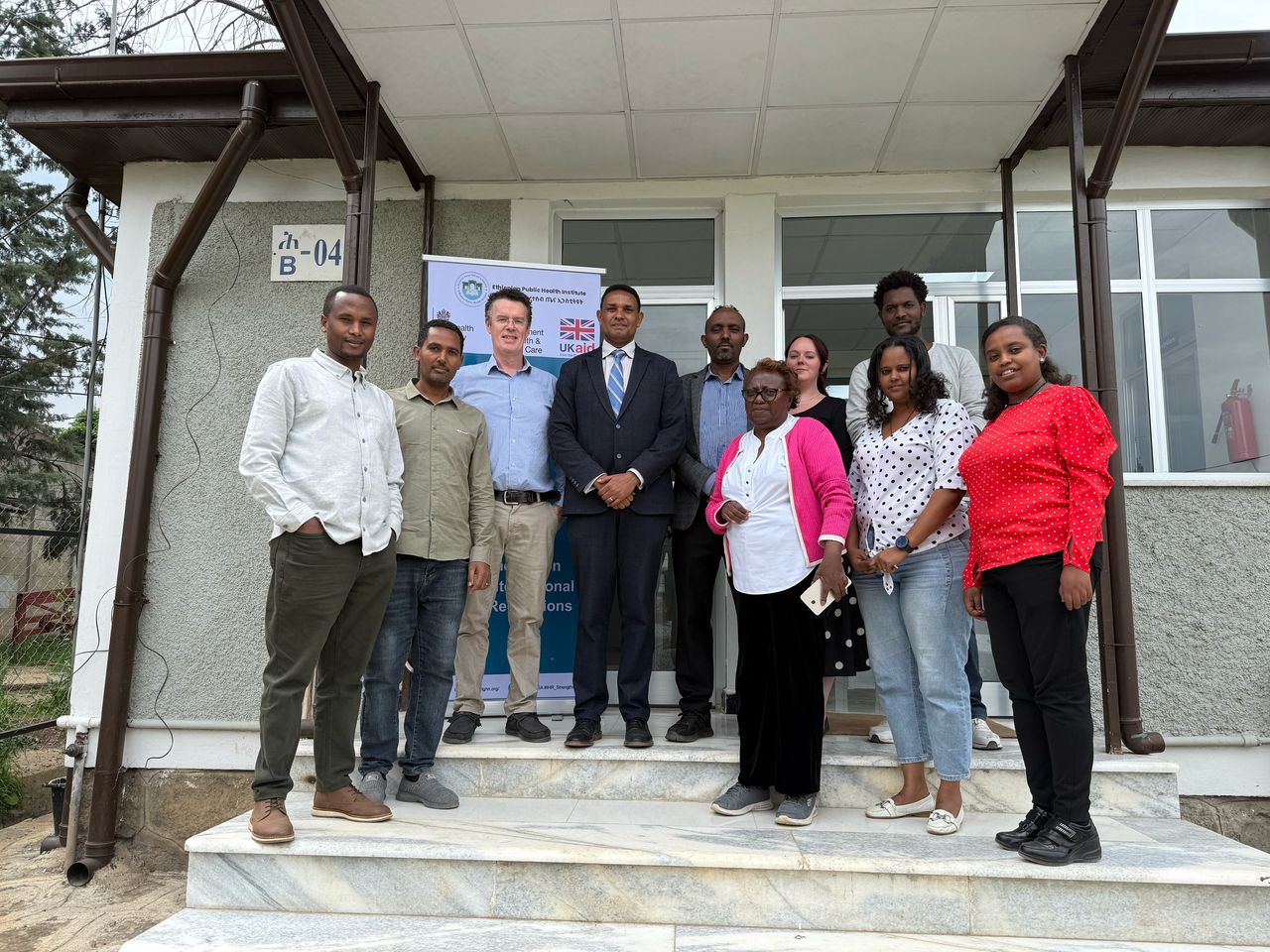
The UK Health Security Agency’s (UKHSA) International Health Regulations Strengthening Project (IHR-SP) has delivered comprehensive training to build Ethiopia’s capacity to safely detect Viral Haemorrhagic Fevers (VHFs) in patient samples. The two-part workshop, conducted in partnership with the Ethiopian Public Health Institute (EPHI) and UKHSA’s Novel and Dangerous Pathogens (NADP) aimed to enable quicker detection and response to VHFs, allowing timely public health interventions, such as quarantine of suspected cases. This early action is key to containing potential outbreaks and reducing the risk of widespread transmission.
VHFs – which include Ebola, Marburg, Lassa Fever, Dengue and Crimean Congo haemorrhagic fever - can cause severe, life-threatening symptoms and are often fatal without prompt medical care. These viruses typically spread through contact with infected animals, insect bites, or direct human-to-human transmission.
Developing skills to improve detection capacity
The sessions were co-developed and co-led by UKHSA’s NADP team and covered topics that align with EPHI’s key objectives of being prepared and ready to respond to any potential VHF outbreaks.
The first four-day workshop held in February 2025 was delivered by a Senior Scientist from the NADP team alongside laboratory technical experts from IHR-SP. Participants completed a comprehensive 8 module e-learning package before attending the in-person training to reinforce the basics of molecular detection of pathogens. This in-person training focused on:
- strengthening core laboratory skills, including aseptic pipetting techniques
- safe inactivation and extraction of samples for VHF real-time PCR testing
- using the QuantStudio 5 realtime PCR platform.
Image above: EPHI laboratory staff practising pipetting techniques
The second four-day workshop concentrated on:
- use of the flexible film isolator for safe inactivation of high-consequence samples, such as blood samples from a patient suspected of being infected with Ebola or Marburg viruses.
- Maintaining the isolator equipment
- Troubleshooting common technical issues.
"The end-to-end sample processing training using the Flexible Film Isolator is a key step in supporting EPHIs capacity strengthening” said Hiwot Hailu, Laboratory Technical Adviser from Ethiopia’s IHR-SP in-country team, based in Addis Ababa. “By equipping staff with essential skills for accurate identification of viral hemorrhagic fever suspected cases, this initiative reinforces Ethiopia’s national emergency preparedness and strengthens public health security.’’
These recent workshops built on previous successful collaborations between UKHSA’s IHR-SP, NADP and EPHI including Biosafety & Biosecurity training in 2018, whole genome sequencing training using the ONT minION in 2020, and Flexible Film isolator maintenance training in 2022.
Proactive approach to regional health security
Whilst Ethiopa has not experienced large-scale VHF outbreaks to date, its geographical position and connectivity place it at increased risk. Approximately 22 million international passengers travel through Bole International Airport in Addis Ababa each year, and the country’s proximity to national recently reporting Marburg cases heightens the imporance of robust detection systems. Additional risk factors include extensive regional trade, internal population displacement and overcrowding.
Image above: EPHI laboratory staff using the FFI to inactive potential high-risk specimens
Immediate application during real-world outbreak
Nonetheless, the timing of this capacity building has proven particularly valuable. During the workshop period, EPHI confirmed the country’s first cases of Mpox. The FFI, along with the newly established laboratory housing it, will serve as a critical facility for conducting timely and accurate Mpox testing, with the trained staff now equipped to safely inactive samples.
Dr. Mesay, Director General of EPHI, personally thanked the team and UKHSA for their ongoing support and commitment to strengthening EPHI’s capacity for the benefit of the Ethiopian people.
The IHR-SP and NADP training programmes continue to support EPHI, with plans for further assistance should suspected VHF cases arise.
Image above: the UKHSA team and EPHI training participants with EPHI Director General, Dr Mesay, outside the new VHF laboratory that houses the FFI and Quantstudio 5 equipment.
Useful Resources
Related Articles
-
From vision to action: Sindh’s IDSR Lab Network Review marks key progress in Pakistan’s IDSR journey
BY Dr Muhammad Sartaj -
Gilgit-Baltistan launches new laboratory network in efforts to strengthen Integrated Disease Surveillance and Response across Pakistan
BY Dr Muhammad Sartaj, Sumera Abid -
Nigeria’s National Reference Laboratory achieves international accreditation
BY Olubunmi Negedu-Momoh -
Pioneering training on “District Health Information System-2” to strengthen Integrated Disease Surveillance and Response System in laboratories in Sindh province of Pakistan
BY IHR -
From Nigeria to The Gambia: IHR-SP advances cross-sectoral leadership in public health
BY Paul Irabor



Please Sign in (or Register) to view further.